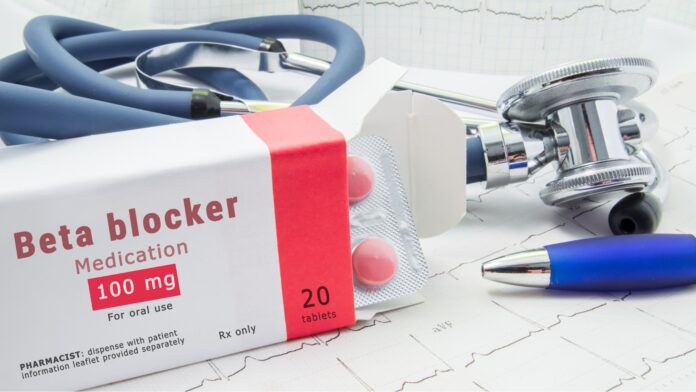You might have heard of beta blockers as a prescription drug for cardiac patients. What exactly are they? These drugs belong to a group of drugs that are capable of slowing your heart rate down. The dampening effect on heart rate prompts many experts to wonder if they are effective for anxiety. This article will discuss beta blockers, their benefits, side effects, and if it is possible to use beta blockers for anxiety.
Adrenaline And Noradrenaline Binding & Beta Receptors
Catecholamines are intrinsic chemicals released by the body. When neurotransmitters such as epinephrine and norepinephrine (noradrenaline and adrenaline) bind to their specific receptors in the cells, catecholamines are released that bring about changes in the cell. The target receptors of adrenaline are known as beta-receptors and are found abundantly in the heart. The result of this binding is an increase in heart rate and an increase in contractility of the heart. The increased pumping of the heart makes you then ready for a stressful situation that requires vigilance, during fight or flight.
Where In The Body Are Beta Receptors?
Beta receptors are located in different parts of the body. These receptors when activated, signal the activation of the sympathetic nervous system. The major locations of beta receptors are at the: heart, kidney and adipose (fat cells).
What They Do
This type of medication is common in the treatment of cardiac patients. It includes drugs such as bisoprolol, propranolol, metoprolol and carvedilol. The drugs reduce the sympathetic activity in cardiac patients and thus help in regulating the blood pressure. Beta blockers compete with adrenaline and noradrenaline in binding on the receptors. These drugs bind to and block the binding of adrenaline and noradrenaline beta receptors, thus called beta blockers. An absence of the hormones means non-activation of the sympathetic system.
The Sympathetic Nervous System & Beta Blockers
To understand how beta blockers work, we will first look at how the sympathetic nervous system carries out its tasks. The sympathetic nervous system is the system of fight-and-flight. This system increases blood flow to your muscles, increases the heart rate and improves vision among other functions. Its primary responsibility is to combat danger to keep you safe.
Impact On The Body
The binding of beta blockers has the following impact on the body:
- It decreases the stress on the heart and leads to a reduced oxygen demand
- It reduces the contraction force of the heart
- The binding also causes relaxation of the blood vessels
- They also obstruct the beta receptors in the kidneys to impede the production of angiotensin 2 hormones (that causes hypertension)
Medical Uses Of Beta Blockers
Used for the management of the following diseases:
- Hypertension
- Angina and chest pain
- Irregular heartbeat management (atrial fibrillations)
- Heart attack patients (myocardial infarction)
- Anxiety management
- Glaucoma treatment
- Hyperactive thyroid
- Tremors
Can Beta Blockers Be Used For Anxiety?
We are now aware of the positive impact in lowering the heartbeat rate and bringing about all the good changes for hypertension. In addition to this, the same class of drugs as beta blockers can also help you manage anxiety. Though not very popular, beta blockers are prescribed either along with alprazolam (xanax) to manage anxiety.
How Do Beta Blockers Work To Relieve Anxiety?
Beta blockers do not alter your perceptions or mental state; instead, they inhibit an anxiety attack’s manifestations. An anxiety attack is characterized by heart palpitations, rapid breathing and chest congestion. These signs and symptoms are the most likely outcomes of phobias and fears, etc. beta blockers are good at inhibiting these responses. It’s are more beneficial than other anxiety drugs; an advantage over other anxiety drugs is that it have less side effects.
Propranolol (Inderal) And Atenolol (Tenormin)
Both propranolol and atenolol are drugs famous for their use by heart patients, but there is more to them. Propranolol is capable of reducing symptoms of anxiety. It improves tachycardia (increased beating rate of the heart) and sweating that is helpful for people suffering from phobias. A detailed study on the effects of propranolol in managing anxiety disorders, such as agoraphobia and Post Traumatic Stress Disorder (PTSD), found that propranolol is helpful in managing phobias. On the other hand, atenolol is potent in managing social anxiety. Most beta blockers produce a wheezing sound in your breath. Luckily, this effect is minimal with atenolol.
Beta Blockers Are Better Used In Patients With Comorbidities
Even though beta blockers are not the most effective way in managing anxiety issues, they become a natural choice of anxiety management in compromised patients. This means that cardiovascular patients are ideal candidates for these drugs. It is however, not recommended for routine use in anxiety management. Antimuscarinic drugs or beta blockers can be effective in the future to treat anxiety. Beta blockers are the drugs that replace and block the adrenaline on the beta receptors, thus inhibiting the sympathetic nervous system’s activation. This blocking is useful in managing high blood pressure conditions in hypertensive and cardiovascular patients. The question of whether beta blockers are effective for anxiety remains, and so to summarise the answer is this: they can also resolve the symptoms of fear and anxiety but can not make the anxiety go away.








